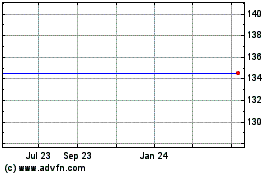Space-Exploration Startup Scores U.S. Regulatory Coup
August 03 2016 - 8:40AM
Dow Jones News
After six years of effort and a roughly $30 million investment,
space-exploration startup Moon Express Inc. just became the first
commercial venture to get U.S. regulatory authorization for a
mission beyond Earth's orbit.
Now the Northern California-based company and internet
entrepreneur Naveen Jain, its chairman and co-founder, need a
reliable rocket, formal launch license and another cash infusion to
turn that historic dream into reality.
Government and Moon Express officials confirmed, as expected,
that an interagency group headed by the Federal Aviation
Administration has signed off on the company's plan to send a tiny,
unmanned scientific spacecraft to the surface of the moon in the
second half of 2017.
The decision stops short of approving the actual launch of a
20-pound rover crammed with scientific instruments, specific
details of which still await a green light from the FAA.
But the months of deliberations leading to Wednesday's
announcement have been closely watched by the burgeoning
commercial-space industry, because the result could set an
important legal and diplomatic precedent for how U.S. authorities
will review and regulate future private missions to the moon,
deeper into space and perhaps eventually to Mars.
The principles are likely to apply to nongovernmental spacecraft
whose potential purposes will range from mining asteroids to
tracking space debris.
Even if the pioneering flight proposed by Moon Express is
delayed, scrubbed or fails, the achievement in breaking through
what had seemed a bureaucratic logjam may help smooth the way for
private space missions envisioned by other companies. Those include
Elon Musk's Space Exploration Technologies Corp., or SpaceX, which
hopes to send a robotic spacecraft to Mars as early as 2018, and
already is engaged in similar regulatory discussions with U.S.
officials. Mr. Musk, who according to NASA officials may spend as
much as $300 million on those initial plans to explore the Red
Planet, has indicated he intends to disclose details next
month.
In the end, the same approval process also may be applicable to
ventures such as in-orbit refueling of satellites, a concept long
promoted by companies such as Boeing Co., Lockheed Martin Corp.,
Orbital ATK Inc., and Space Systems Loral, a unit of Canada's
MacDonald Dettwiler and Associates Ltd.
The government's decision is "really a symbol of what a small
group of entrepreneurs are capable of doing" when it comes to
expanding space endeavors, Mr. Jain said in an interview. It
underscores that the "best way to commercialize space," and tap the
potential of extracting material from the lunar surface, "is
through private enterprise."
U.S. officials sought a way to comply with longstanding
international treaty obligations calling for nations to supervise
all missions outside Earth's orbit. In the past, such missions were
all devised and funded by governmental entities, which had
clear-cut responsibility to authorize and monitor them.
But under the first-of-its-kind process established for Moon
Express, U.S. agencies conducted a detailed payload review that
encompassed issues such as ensuring that the company's lander
wouldn't damage or pollute the lunar surface.
Ultimately, Moon Express hopes to mine and retrieve minerals, as
well as provide a potential platform for producing propellants to
power future deep-space missions. Reaching those goals will require
a host of engineering and scientific breakthroughs. But Congress
set the stage for such ventures last year by protecting corporate
property rights.
Wednesday's announcement "really establishes that the
legislation now applies to the private sector," said Bob Richards,
another company co-founder.
Moon Express also has attracted attention due to the relatively
low cost of its MX-1 lander and anticipated launch contract, which
Mr. Jain said together are expected to amount to about $10 million.
That is a tiny fraction of the many hundreds of millions of dollars
it takes to build and send traditional unmanned missions to the
moon, other parts of the solar system or further into space.
Apart from the focus on novel technology, Moon Express and its
proponents have prompted debate on Capitol Hill about how the U.S.
government, in coming decades, can effectively oversee what is
projected to be a surge in commercial ventures outside the
atmosphere.
Earlier this year, the Obama administration sent draft
legislation to Capitol Hill seeking to establish a common
regulatory framework for future commercial missions beyond Earth's
orbit.
In June, Michael Gold, head of Loral's Washington office and
chairman of an FAA advisory panel, told a House transportation
subcommittee that swiftly passing such a bill is essential to
maintaining U.S. competitiveness in space. Currently, the FAA's
commercial space office is "responsible for rockets that go up, and
then capsules or other payloads that come down," he said. But there
is a big regulatory gap, Mr. Gold asserted, because "everything
that occurs in between remains in a literal and legal vacuum."
Write to Andy Pasztor at andy.pasztor@wsj.com
(END) Dow Jones Newswires
August 03, 2016 08:25 ET (12:25 GMT)
Copyright (c) 2016 Dow Jones & Company, Inc.
Orbital Atk, Inc. (delisted) (NYSE:OA)
Historical Stock Chart
From Jun 2024 to Jul 2024

Orbital Atk, Inc. (delisted) (NYSE:OA)
Historical Stock Chart
From Jul 2023 to Jul 2024
